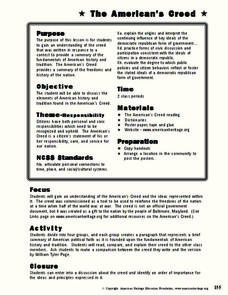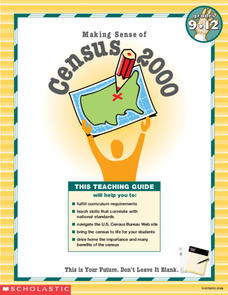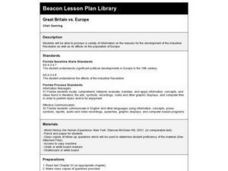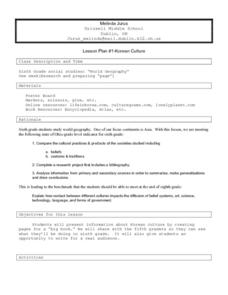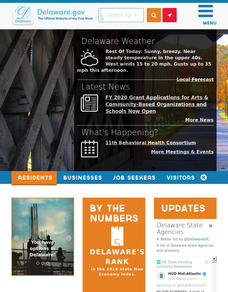Curated OER
No Food, No Money, No Job: What to Do?
Students explore the concept of philanthropy. In this service learning lesson, students research the Civilian Conservation Corps and create an advertisement that might have promoted it.
Curated OER
Trundle Wheel
Sixth graders explore the uses of a trundle wheel. In this units of measurement lesson plan, 6th graders use trundle wheels to measure distances.
Curated OER
Angle Land and Angle Aerobics
Sixth graders investigate different types of angles. In this geometry lesson, 6th graders use a protractor to identify acute, obtuse, and straight angles.
Curated OER
The Bill of Rights: Debating the Amendments
Students explore the Bill of Rights. In this U.S. Constitution lesson plan, students participate in classroom debate regarding the first 10 amendments to the Constitution. Students then vote for the amendments they would like to ratify.
Curated OER
"An Eye For An Eye, A Tooth For A Tooth"
Sixth graders debate their reactions to two different historical documents about managing a society. In this U.S. history lesson, 6th graders read two articles on codes and laws from different time periods and debate their thoughts.
Curated OER
The American's Creed
Students explore the meaning of the American's Creed. In this civics lesson, students examine the creed, define related vocabulary words, and write their own creeds.
Curated OER
Technology (Post Lab): Utility Companies
Students study physics. In this utility company research instructional activity, students discover how their local utility company charges for electricity. They listen to a presentation and then conduct internet research to find more...
Curated OER
Making Sense of the Census
In this unit of lessons, students make sense of the census. They examine why a census is taken and partipate in activities.
Curated OER
What is the (No) Establishment Clause?
High schoolers research and discuss the Establishment Clause.
Curated OER
Great Britain's Greatest Queen
Fourth graders explore the reign of Queen Victoria and the significant political developments in the 19th century.
Curated OER
Happy Birthday Whitehouse
First graders explore the White House and its history through celebrating its birthday. Basic facts are examined and personal experiences related to the exploration of this structure.
Curated OER
Realism In Chinese Art
Students examine the artistic terms realism and idealism through the study of Chinese art and artifacts in this lesson plan for the Social Studies classroom. Evaluation is accomplished through an in-class essay.
Curated OER
Great Britain vs. Europe
Fourth graders explore the reasons for the Industrial Revolution and its effects on France.
Curated OER
Breadline
Young scholars examine the breadlines during the Great Depression. They view a short video about different country's responses to mass unemployment. They interview family members if possible who lived during the Depression.
Curated OER
Lesson on Federalism
Eleventh graders study Federalism and delegated, reserved, and concurrent powers. They participate in a simulation in which they role-play Federalists and Anti-federalists debating which powers should be categorized as delegated,...
Curated OER
Social Studies: Debating Aid to Micronesia
Young scholars simulate a debate about continued U.S. aid to the Federated States of Micronesia. In two large groups, they research the history of Micronesia and how it was affected by colonization and trusteeship. After the debate,...
Curated OER
Bill O'Rights
Students discuss and identify the first ten amendments to the Constitution and apply their understanding of the material to how they currently affect their lives. They discover the rights and responsibilities of being a citizen, and...
Curated OER
Zhou Dynasty
Students research the contributions of the Zho Dynasty. They identify the Mandate of Heaven, and the growth of the economy under the Zhou. They research the history of the discovery of silk and its role as an export. Finally, they...
Curated OER
Calculate Your Contribution
Young scholars assess the environmental impact of their transportation choices. They keep a transportation journal and use a website to calculate vehicle emissions for themselves and their class. They evaluate their transportation choices.
Curated OER
Kosovo: Where is It and What's All the Fuss About?
Students investigate the US military involvement in Kosovo and answer teacher generated questions.
Curated OER
Korean Culture
Sixth graders complete a research project for the sixth grade Big Book that is to be shared with the 5th graders. Students should take their time because the project represents them and the whole class.
Curated OER
The Abolitionist Movement
Eleventh graders examine a petition presented by the Quakers to the Delaware General Assembly in 1785 and an anti-slavery broadside published in 1836.
Curated OER
Election 2000
Young scholars review the 2000 presidential election. Students write an expository essay in response to the following: Should the election process in the United states be changed?
Curated OER
The Formation and Function of the Supreme Court
Students analyze the role of the U.S. Supreme Court. They read a handout and Article III, section 1 of the Constitution, analyze and rate by relevance noteworthy Supreme Court cases, and write how they decided each rating.







